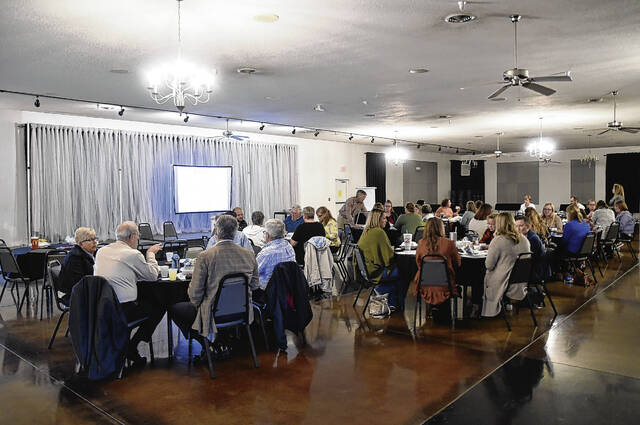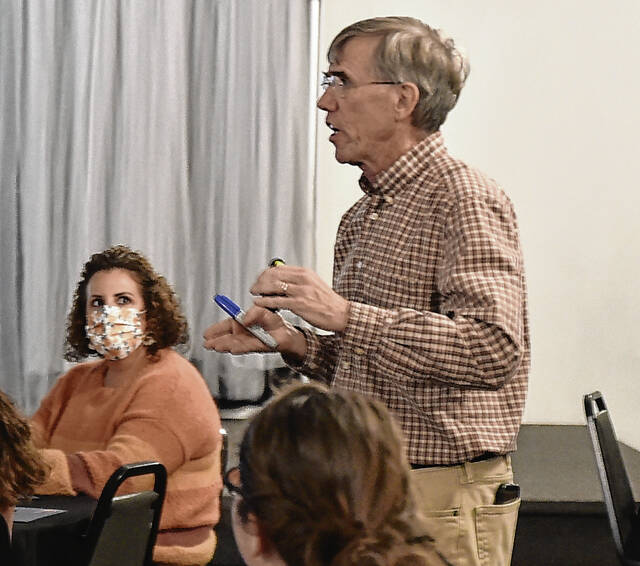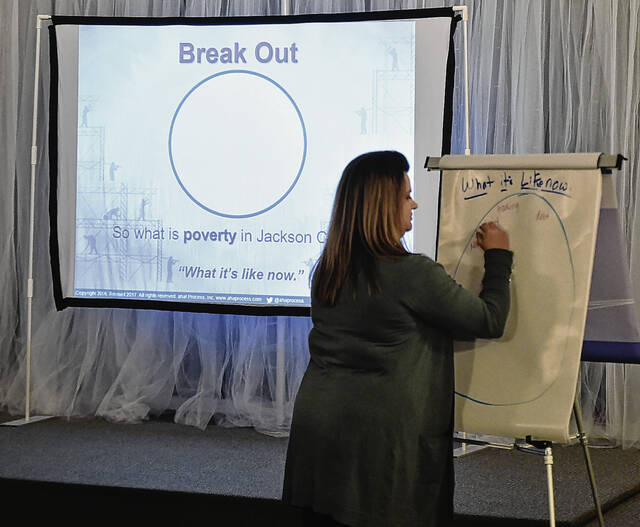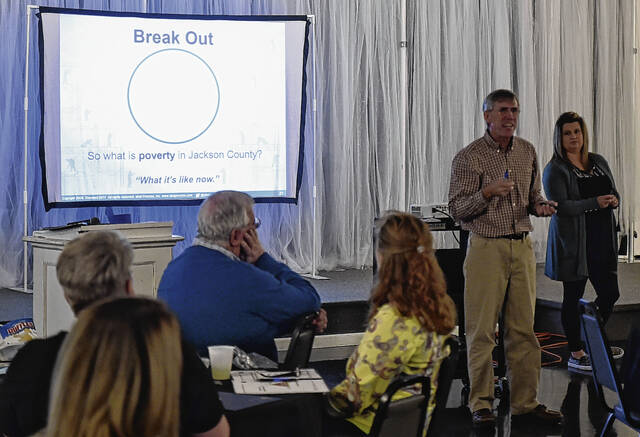
Members of the community attend the Bridges Out of Poverty workshop last Thursday at Pewter Hall, 850 W Sweet St., Brownstown.
Mitchell Banks

Guest speaker Jim Ott lectures during the Bridges Out of Poverty workshop.
Mitchell Banks

Anchor House Executive Director Megan Cherry writes down some examples of what life in poverty is like in Jackson County as a part of a group exercise.
Mitchell Banks

Anchor House Executive Director Megan Cherry, far right, and guest speaker Jim Ott, second from right, facilitate the Bridges Out of Poverty workshop.
Mitchell Banks
Sixty members of the community gained a new understanding of poverty thanks to the Bridges Out of Poverty workshop held last Thursday at Pewter Hall in Brownstown.
Adapted by training and publishing company aha! Process from Dr. Ruby Payne’s book, “Bridges Out of Poverty: Strategies for Professionals and Communities,” the focus of the workshop was to analyze poverty through the lens of economic class to gain a better understanding of what a family in poverty might be going through.
Participants attended a lecture, completed exercises with each other and looked at data to better understand how those in the middle class view those in poverty and how families in poverty adapt to society by having more of a survival mindset.
Guest speaker Jim Ott of aha! Process and Megan Cherry, executive director of Anchor House Family Assistance Center and Pantry in Seymour, led the workshop, which was funded by the Community Foundation of Jackson County through a grant from Lilly Endowment Inc.
Anchor House and the Jackson County United Way partnered with the foundation to be able to provide the program.
Ott, an Iowa native, said he has been presenting the workshop for 15 years. For a three-hour workshop, he said it is less about equipping people with skills or tools to fight poverty, but more about having a mindset to know how people live while being financially unstable and how the middle class thinks of people less fortunate than themselves.
“It’s about self-examination,” he said. “It’s about realizing ‘OK yeah it’s important for me to understand how people different than me live, but I also need to understand why I think the way I think about people who live differently than me.’”
In Jackson County, 15% of families live in poverty and 24% of families are employed and live above the federal poverty line, but still earn less than the basic cost of living.
While there have always been people living in poverty, Cherry said she felt having the workshop now is as relevant as it’s ever been.
“I think the conversation is even more important right now as we’re on the other side of a pandemic that we, as a generation, have never experienced,” she said. “That has thrown a lot of people into different situations so I think that’s more important now because of that. “
One lesson from the workshop was that there are “hidden rules” in society, which are unspoken cues done by people in a group to make people feel like they belong.
An example of this would be when it comes to money, those in poverty think money should be used or spent and people in the middle class might have a financial outlook that money should be saved or managed.
Another was how people in the middle class tend to think that anything can be done by themselves and getting help is seen as being weak.
Jena Hanks, financial stability program manager for Jackson County United Way, said hidden rules was a concept that really stuck with her when doing the workshop. She said the workshop was wonderful and thought it was going well.
“It’s been a nice workshop and it’s good to see so much of the community come together and learn about sensitive topics,” Hanks said.
Donna Persinger, a program facilitator for Mental Health America of Jackson County, said the workshop had given her perspective on how people in poverty can be intimidated by people in the middle class.
For Alison Roberts, a leasing agent and administrative assistant for Thrive Alliance, the workshop helped her understand those she works with at her job.
“I’m new to working for a not-for-profit so this has given more insight on how I can work with those in the poverty level,” she said.
A lesson that stuck with her from the workshop was that even though some services exist to help people in poverty, they can feel like they are an issue since they have to ask for help.
Mental Health America of Jackson County Executive Director Melanie O’Neal had a similar takeaway from the workshop. She said she learned that middle class citizens view some societal necessities, like education or healthcare, as only there to serve them. Because of this, people from a lower class might not be as motivated to use these necessities.
Having many members of the community attend the program, Cherry said she hopes the outreach for people in poverty doesn’t end with the workshop.
“Hopefully it’s just an introduction and we’re able to continue to work throughout the community and help people understand the things that we can do and the changes that we can make to work with families in poverty,” she said.
